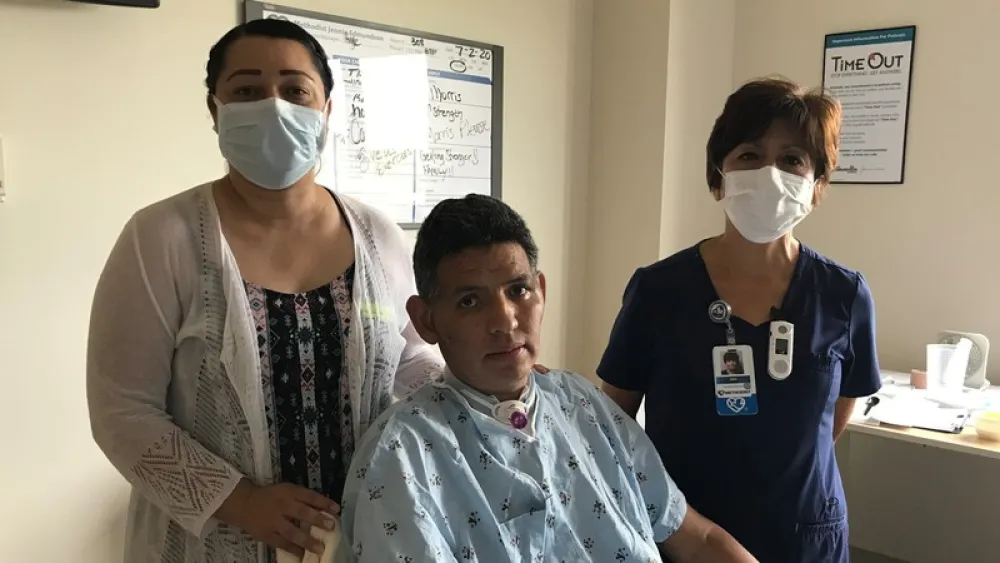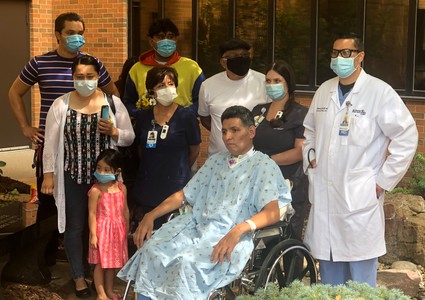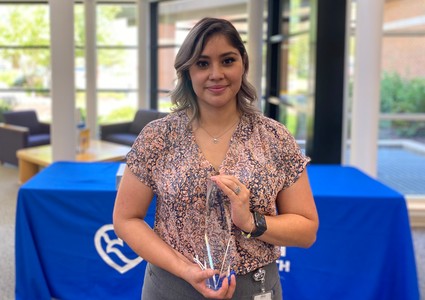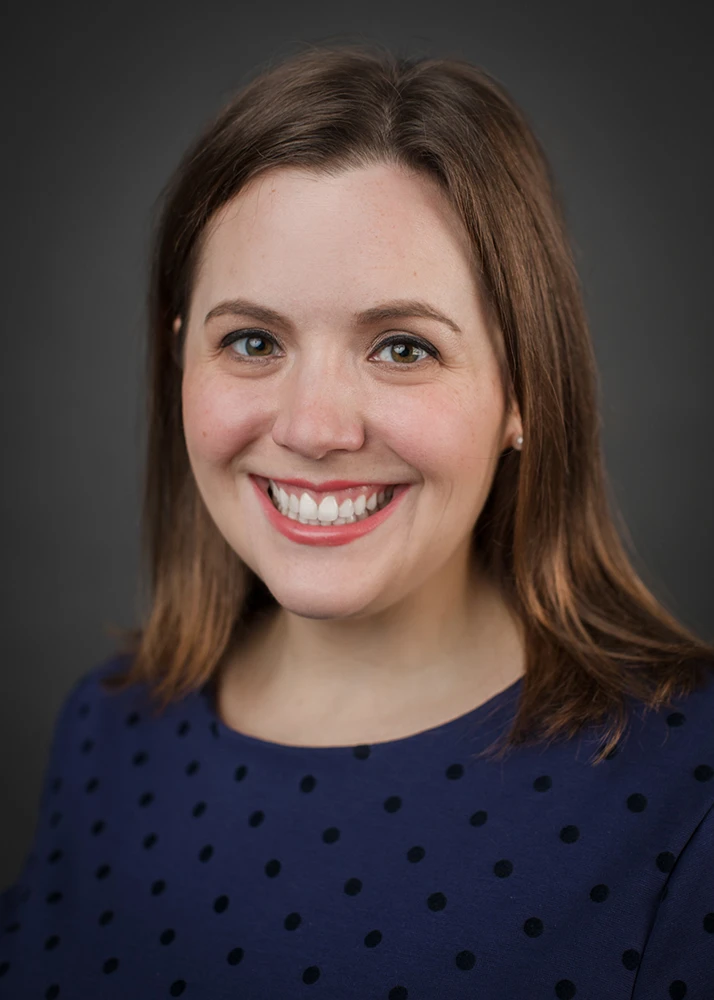




Inspiring Stories
Unsung Heroes of COVID-19: Language Interpreters Become Lifelines for Communities
Published: Sept. 14, 2020

All Around the Hospital
Prior to the pandemic, a typical day for Calderon and Tyson could include translating materials or accompanying patients to interpret at clinic appointments, CT scans, emergency department visits, births, surgeries and more.
“Everything that goes on around the hospital is on our schedule,” Calderon said.
Calderon, who has been with Methodist Fremont Health for 13 years, became a language interpreter almost by accident. While applying for a different position at the hospital, the language services coordinator at the time heard her interpret and offered her a job on the spot. Calderon’s family is from Mexico, and she lived there in middle school, but she supplemented her Spanish with medical interpreting classes at College of Saint Mary and Metropolitan Community College.
Tyson was encouraged to become a language interpreter by her husband. Born in Peru, she studied English as a second language in high school and took more English classes when she moved to the U.S. Seeing the need for Spanish interpreters, she also enrolled in a medical interpreting class at Metropolitan Community College. She has been with Jennie Edmundson since 2002.
“This Is Happening. This Is Real”
At the beginning of the pandemic, neither Tyson nor Calderon realized the extent that COVID-19 would affect Latinos in their communities and what that meant for their roles. Tyson didn’t anticipate working so closely with doctors and nurses for sometimes weeks at a time. Calderon expected something resembling flu season – something that would end, and not something with such heartbreaking outcomes. They worked with patients and their families to interpret every piece of news – the good and the bad.
“A lot of days I went home numb … numb,” Calderon said. “Because I would see the doctors and nurses working on patients – doing their best and giving it their all – and yet, the patients weren’t getting better. When I’d go home, I’d feel like, ‘Man, this isn’t fair.’ Because they were young patients in their 30s, 40s and 50s. I’d wonder, ‘What makes me special and not them? Why do I get to go home to my children and my husband, and why can’t they?’”
At Jennie Edmundson, Tyson became an essential member of 44-year-old Morris Sandoval’s care team when he was hospitalized for more than 30 days with COVID-19 from late May to early July. She had to be in regular communication with Sandoval’s medical team as she fielded phone calls from his family all over the country.
“That was my job almost every day,” she said. “I was the person who was bringing news to them until Mrs. Sandoval came and stayed with her husband.”
Tyson admits she was scared – she took extra precautions to not bring COVID-19 home to her high-risk husband. But she said helping Sandoval and his family felt good, too.
“I was happy when I helped the family,” she said. “And then when Mrs. Sandoval came, we helped her feel OK at the ICU because she couldn’t go anywhere.”

care team
The day Sandoval was discharged was a joyful one – he was reunited with his whole family after a long separation.
“It was precious. I was happy for them,” Tyson said. “His wife thought he was going to die. She said it was a miracle. It was a miracle that he came out of this disease.”
For all the lows Calderon has witnessed at Methodist Fremont Health, there are still moments of light. She’s touched by pastors who pray for COVID-19 patients in the parking lot. She recalls one who would come every night at midnight to pray. And despite her fears, she’s inspired by her coworkers.
“Working in the hospital and seeing how brave my coworkers are – doctors, nurses – makes me be that much braver,” she said. “If they can do it, I can do it, too.”
But she’s frustrated by those who dismiss the severity of COVID-19 or think it only affects older adults – she has seen people in their 30s and 40s with young children die.
Tyson, too, would like to see people take COVID-19 more seriously.
“This is happening,” she said. “This is real. People are not lying. Be cautious, or at least think of others.”
Dedicated to Their Communities
The COVID-19 pandemic may have brought unexpected challenges, but Tyson and Calderon remain committed to their communities.
“I love my job,” Tyson said. “I like to help people. This is the way I help Latinos – with communication. And I go beyond that, too. I do all that they ask me to do so they can feel that I’m here to help them – to have Jennie Edmundson help them.”
Calderon feels the same way.
“I’m very proud of our language services department at Methodist Fremont Health because I feel that we are a great team, and a lot of the community knows us,” she said. “We’re advocating for the patients a lot, trying to find them resources. So besides interpreting, we try to go a little above and beyond to help the patient get to where they need to be.”

Fremont Health
Calderon’s work during the COVID-19 pandemic hasn’t gone unnoticed by her coworkers or community. In August, she was honored with Methodist Fremont Health’s 2020 Caring Kind Award, a long-running award from the Nebraska Hospital Association honoring exemplary health care workers.
“I’m very honored to receive The Caring Kind Award – on behalf of everyone that works behind the scenes in the medical field, as we also try to make a difference in all that we do,” Calderon said.
Both Tyson and Calderon stress that most patients and families they interpret for speak English, but medical terminology can be difficult to understand, and medical settings can be intimidating. The ability to communicate in your first language when you’re vulnerable and scared is a relief. And to have a human on the other side of that conversation makes patients feel less alone. Tyson remembers interpreting for a man with a concussion in the emergency department and how responsive he became when she simply said, “Buenos días.”
“I felt so good that day,” Tyson said. “He looked at me like I was his hero.”
Breaking down language barriers and improving access to care for Latinos? “That’s The Meaning of Care,” she said.
More Resources
- Read about more unsung heroes of COVID-19 – respiratory therapists.
- Fact or fiction? Get the truth about 10 masking myths.
- Read more stories of Methodist employees living The Meaning of Care.


